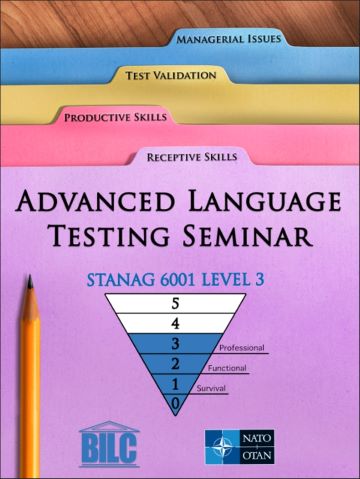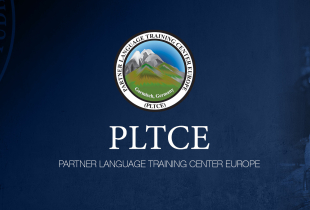
Advanced Language Testing Seminar
The ALTS is a NATO approved course and addresses the following NATO training requirements:
- Norm and standardize application of STANAG 6001 to ensure interoperability
- Develop language assessment and validation tools IAW STANAG 6001
The ALTS is listed in eTOC under ETE-LA-45454 (https://e-itep.act.nato.int/Guest/ETOCindex.aspx)
Course Description
The Advanced Language Testing Seminar is a highly technical seminar for experienced STANAG 6001 test developers. The Advanced Language Testing Seminar builds on the concepts presented in the foundation course, the Language Testing Seminar. The Advanced Language Testing Seminar emphasizes STANAG 6001 standardization, testing levels 2+/3, moderating listening and reading items, practical exercises in conducting and rating speaking and writing tests, qualitative and quantitative analysis of tests and test data, sharing of lessons learned and best practices, and a discussion of common concerns, challenges, and trends in test administration/ management of a testing system.

Aim
The aim of the Advanced Language Testing Seminar is to improve and standardize STANAG 6001 testing across the nations, especially at the critical proficiency levels, STANAG 6001 levels 2+/3. The Advanced Language Testing Seminar establishes a forum for norming national STANAG 6001 testers, provides participants with updates on language testing practices and interoperability concerns in NATO, and gives them an opportunity to exchange ideas and find solutions to their testing challenges. The goal is to promote standardized language testing and improve linguistic interoperability in the Alliance and with its partners.
Training Strategy
Blended learning. There are extensive pre-seminar assignments available through a Learning Management System (LMS) prior to the seminar. The in-residence modules take place over three weeks: Module 1, Receptive Skills Testing; Module 2, Productive Skills Testing; Module 3, Test Validation; and Module 4, Managerial Issues. These plenary sessions and small group activities are led by BILC testing subject matter experts (SMEs). There are daily homework assignments.
Final Learning Outcomes
Participants will
- reinforce their skills in assessing language proficiency IAW STANAG 6001, especially at Level 3
- be normed with STANAG 6001 testers from the nations represented in the seminar
- learn current practices in criterion–referenced test validation
- exchange ideas and find solutions to their testing challenges
Learning Objectives
Participants will
- participate in norming activities for the skills of listening, speaking, reading and writing
- follow sound test item moderation practices to moderate each other’s Level 3 national reading and listening test items
- determine appropriate item formats for testing the receptive skills
- locate authentic listening texts and use software tools to edit the texts
- identify valid test administration procedures
- apply the Benchmark Advisory Test (BAT) protocol during practical exercises in conducting and rating speaking and writing tests
- discuss effective procedures for trialling tests and test items
- carry out qualitative and quantitative analyses of tests and test data
- assess the strengths and weaknesses of their national STANAG 6001 testing programs and propose possible Quality Assurance (QA) measures
- identify evidence for validity arguments
- share lessons learned and best practices with other participants
- discuss common concerns, challenges, and trends in test administration/management of a testing system
Duration: 3 weeks
Eligibility
National STANAG 6001 testers who have successfully completed of the Language Testing Seminar followed by at least one year of experience working as a tester or test developer. SLP 3/3/3/3 or higher.
Registration Process: 12 weeks before the start of each course, invitations are issued to national BILC Points of Contact. Applications from qualified candidates are due to PLTCE no later than six weeks before the course starts; actual deadlines are stated in each invitation. Partner nations using e-Prime or with PD-funded seats must still apply in accordance with invitation instructions and within the prescribed time frame.
Email: BILC [at] marshallcenter.org
Course Details
Artillery Kaserne
Breitenauer Strasse 16
Gebaude 253
Garmisch-Partenkirchen 82467, Germany
12 weeks before the start of each course, invitations are issued to national BILC Points of Contact. Applications from qualified candidates are due to PLTCE no later than six weeks before the course starts; actual deadlines are stated in each invitation. Partner nations using e-Prime or with SHAPE Partnership funded seats must still apply in accordance with invitation instructions and within the prescribed time frame.

